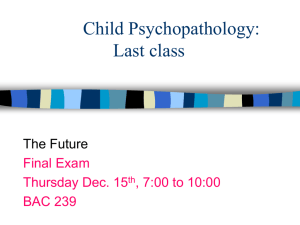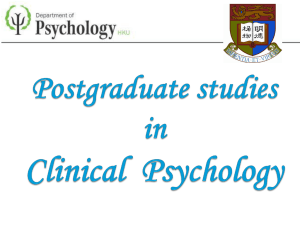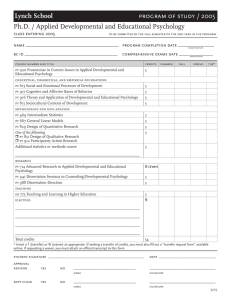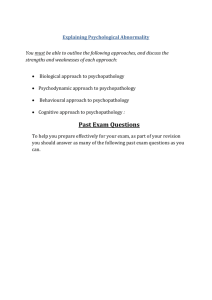Area of Emphasis Description of Area of Emphasis
advertisement
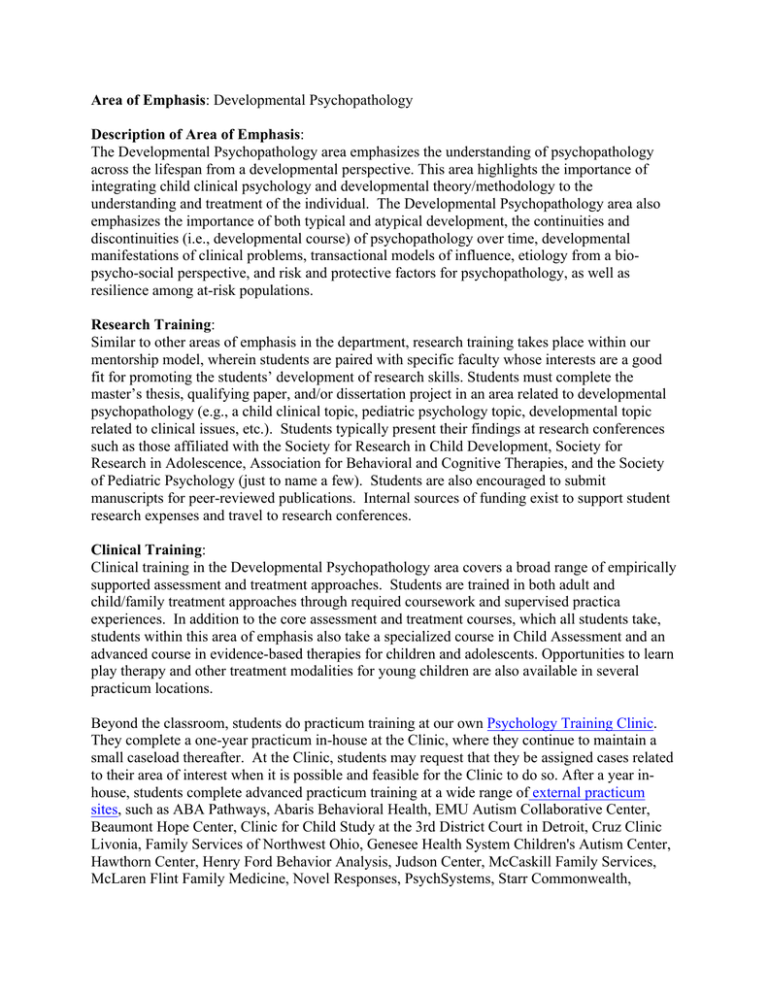
Area of Emphasis: Developmental Psychopathology Description of Area of Emphasis: The Developmental Psychopathology area emphasizes the understanding of psychopathology across the lifespan from a developmental perspective. This area highlights the importance of integrating child clinical psychology and developmental theory/methodology to the understanding and treatment of the individual. The Developmental Psychopathology area also emphasizes the importance of both typical and atypical development, the continuities and discontinuities (i.e., developmental course) of psychopathology over time, developmental manifestations of clinical problems, transactional models of influence, etiology from a biopsycho-social perspective, and risk and protective factors for psychopathology, as well as resilience among at-risk populations. Research Training: Similar to other areas of emphasis in the department, research training takes place within our mentorship model, wherein students are paired with specific faculty whose interests are a good fit for promoting the students’ development of research skills. Students must complete the master’s thesis, qualifying paper, and/or dissertation project in an area related to developmental psychopathology (e.g., a child clinical topic, pediatric psychology topic, developmental topic related to clinical issues, etc.). Students typically present their findings at research conferences such as those affiliated with the Society for Research in Child Development, Society for Research in Adolescence, Association for Behavioral and Cognitive Therapies, and the Society of Pediatric Psychology (just to name a few). Students are also encouraged to submit manuscripts for peer-reviewed publications. Internal sources of funding exist to support student research expenses and travel to research conferences. Clinical Training: Clinical training in the Developmental Psychopathology area covers a broad range of empirically supported assessment and treatment approaches. Students are trained in both adult and child/family treatment approaches through required coursework and supervised practica experiences. In addition to the core assessment and treatment courses, which all students take, students within this area of emphasis also take a specialized course in Child Assessment and an advanced course in evidence-based therapies for children and adolescents. Opportunities to learn play therapy and other treatment modalities for young children are also available in several practicum locations. Beyond the classroom, students do practicum training at our own Psychology Training Clinic. They complete a one-year practicum in-house at the Clinic, where they continue to maintain a small caseload thereafter. At the Clinic, students may request that they be assigned cases related to their area of interest when it is possible and feasible for the Clinic to do so. After a year inhouse, students complete advanced practicum training at a wide range of external practicum sites, such as ABA Pathways, Abaris Behavioral Health, EMU Autism Collaborative Center, Beaumont Hope Center, Clinic for Child Study at the 3rd District Court in Detroit, Cruz Clinic Livonia, Family Services of Northwest Ohio, Genesee Health System Children's Autism Center, Hawthorn Center, Henry Ford Behavior Analysis, Judson Center, McCaskill Family Services, McLaren Flint Family Medicine, Novel Responses, PsychSystems, Starr Commonwealth, Sunfield Center, The Guidance Center, Thriving Minds Behavioral Health, University of Michigan Mary Rackham Institute, University of Michigan Pediatric Psychology, University Pediatricians Autism Center Courses: In addition to the Core Program of Study taken by all students, those in the Developmental Psychopathology Area take additional courses relevant to this area of emphasis including Child & Adolescent Psychopathology, Evidence-Based Therapies for Children and Adolescents, Advanced Child Assessment, as well as a number of other electives. A student's choice of core courses and electives is made in consultation with the faculty mentor. Affiliated Faculty and Related Interests: Jin Bo, Ph.D. (Cognitive Neuroscience) – Behavioral and neural mechanisms of age-related differences in individuals with cognitive and motor difficulties, such as children with Autism Spectrum Disorders, Developmental Coordination Disorder, ADHD and older adults with mild cognitive impairments. Approaches to facilitate learning to improve cognitive and motor functions in these populations. Michelle Byrd, Ph.D. (Child Clinical and Pediatric Psychology) – Integration of behavioral and medical care in pediatric healthcare settings, parent training programs, the incorporation of acceptance-based strategies in the treatment of medically ill populations. Chong Man Chow, Ph.D. (Developmental Psychology) – Friendships and romantic relationships in the adolescent and young adult developmental periods, close relationships in relation to health and well-being, dyadic and longitudinal analyses. Carol (Ketl) Freedman-Doan, Ph.D. (Child & Adolescent Clinical Psychology) – Childhood stress and its impact on executive functioning, working memory, and attention; parenting factors and parent-child relationships that influence child and adolescent outcomes. Alissa Huth-Bocks, Ph.D. (Child Clinical Psychology) – Early forms of developmental psychopathology, infant and toddler mental health, child traumatic stress, parent-child attachment, familial forms of violence such as child maltreatment and intimate partner violence. Heather Janisse, Ph.D. (Developmental Psychology) – Pediatric obesity, interventions for at-risk preschoolers, health disparities in at-risk minority populations, parent-child relationships and child outcomes, developmental methodologies Renee Lajiness O’Neil, Ph.D. (Pediatric Neuropsychology) – Neurodevelopmental disorders such as Autism Spectrum Disorders, language based learning disability, and ADHD, cognitive, behavioral and neural correlates of these disorders using neuropsychological measures and functional neuroimaging such as magnetoencephalography (MEG), early identification of risk and resilience factors in neurodevelopmental and acquired disorders of childhood Catherine Peterson, Ph.D. (Pediatric Psychology) – Neurocognitive and psychological issues associated with chronic medical conditions in childhood such as childhood cancer, type 1 diabetes, sickle cell disease, and recurrent pain; psychological outcomes, academic achievement, quality of life, family burden, and family intervention related to pediatric medical populations.
